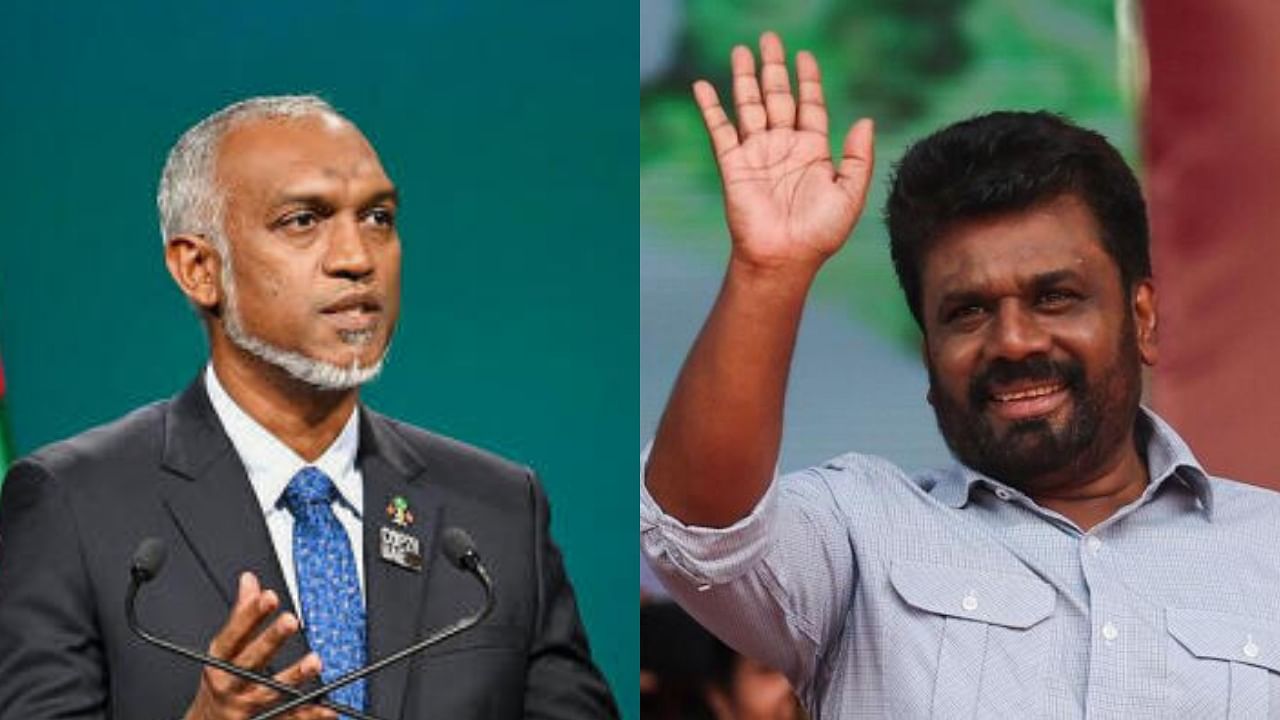
(L-R) Mohamed Muizzu, Maldives President and Anura Kumara Dissanayake, Sri Lanka's President
Credit: PTI and Reuters Photos
They appear as tiny specks in the vast expanse of the Indian Ocean. But the geostrategic location of Sri Lanka and the Maldives, straddling vital sea lanes as they do, has meant they occupy a considerable amount of mindspace in New Delhi’s strategic calculus amid China’s deepening inroads. This has been all the more true in recent weeks with Sri Lanka having voted a Left-leaning President, while the anti-India government of the Maldives is gradually pivoting towards its larger neighbour after months of decidedly icy relations.
Having practised “strategic patience” with the Maldives ever since Mohamed Muizzu became President last November, India seems to be gaining salience in the archipelago once again. The China-leaning Muizzu government appears quite keen now to bury the hatchet with India and is all set to make his first bilateral visit here, after cold-shouldering New Delhi since his election victory achieved on the back of an ‘India Out’ campaign.
Looking to India for assistance to avoid a financial crisis, Malé has been forced to make conciliatory overtures. The archipelago needs to repay a debt of $1 billion by 2026 and is in desperate search of a swap deal with India to avoid a default. Its downgrading by credit rating agency Fitch owing to its heightened risk of default, too, has lent a sense of urgency to Muizzu’s visit. Maldives’ depleting forex reserves also spell trouble for a nation dependent on imports to meet its food and fuel requirements.
In all likelihood, Delhi will announce a bailout package only if Malé commits to safeguarding India’s strategic interests. Muizzu has already given Delhi much grief by forcing it to withdraw its military personnel who were stationed in the Maldives to operate two helicopters and a Dornier aircraft.
While India-Maldives ties appear to be on the mend, Delhi is not wasting any time in its outreach to new Sri Lankan President Anura Kumara Dissanayake, with External Affairs Minister S Jaishankar headed for Sri Lanka. Dissanayake leads the National People’s Power (NPP), a coalition of which his party the Janatha Vimukthi Peramuna (JVP) is a core constituent. He is a somewhat unknown entity for Delhi. The JVP’s direct links to the Communist Party of China as well as its anti-India stance in the past means Delhi will approach its ties with the new President with caution.
India would have been pleased had incumbent Sri Lankan President Ranil Wickremesinghe, with whom it had a comfortable working relationship, won. But Sri Lankans were looking for a “change” and decided to dump its old, jaded political class in favour of a man who promised to act against the corrupt, reduce taxes and work for his country’s economic recovery.
India did well in reaching out to Dissanayake months ahead of the presidential polls, once it realised he could be a serious contender for the top post, unlike in Bangladesh where it was caught completely off-guard by Sheikh Hasina’s ouster. Invited to India, he had meetings with both Jaishankar and National Security Adviser Ajit Doval.
The high-level engagement would have allowed both sides to share the expectations they have from each other. For sure, Delhi would have spelt out the red lines in so far as its strategic interests in Sri Lanka are concerned. Following his win, Dissanayake has declared that Sri Lanka will keep in mind the security interests of its neighbours, especially India. Whether he keeps to this commitment remains to be seen.
For India, what would also be crucial is the approach Dissanayake will adopt on the implementation of the 13th constitutional amendment devolving powers to Sri Lanka’s northern and eastern provinces where the Tamil population is concentrated. The JVP is known for aggressively promoting Sinhala nationalism and opposed the 1987 Indo-Sri Lanka peace accord. It has not committed to the 13th Amendment in its manifesto.
For now, Dissanayake’s immediate focus would be on the upcoming parliamentary polls in Sri Lanka, while working to extricate his country from the economic quagmire it finds itself in. He may find his promise of tax cuts difficult to implement given that the IMF bailout has entailed increasing government revenue through unpopular decisions such as raising taxes, increasing the cost of utilities and curtailing public expenditure.
For the new Sri Lankan President, it will be baptism by fire. He will have to walk the fine balance between populism and economic pragmatism. With just three seats in the recently dissolved parliament, Dissanayake will be hoping to increase this tally substantially to further consolidate his hold on
governance.
Delhi, in the meantime, will exercise “strategic patience”, hoping not to lose influence in Sri Lanka to China. The financial assistance it provides to Indian Ocean Rim nations, who can avail of it without fear of falling into a ‘debt trap’, has eventually helped turn the tide in Delhi’s favour.
(The writer is a senior journalist)